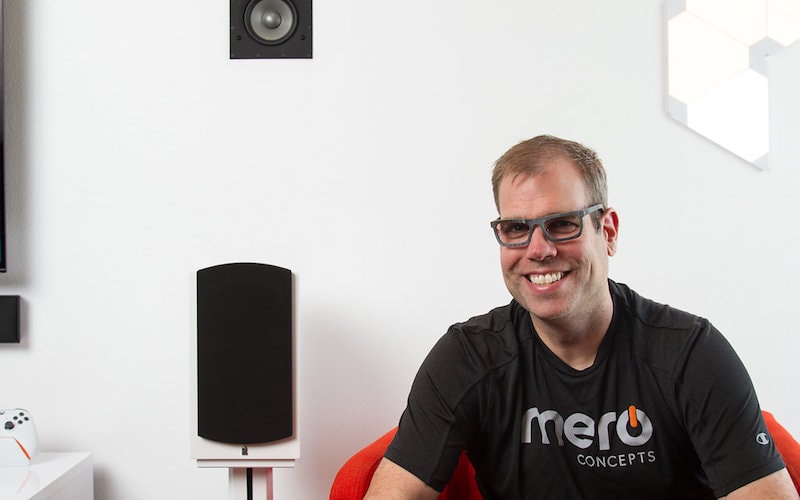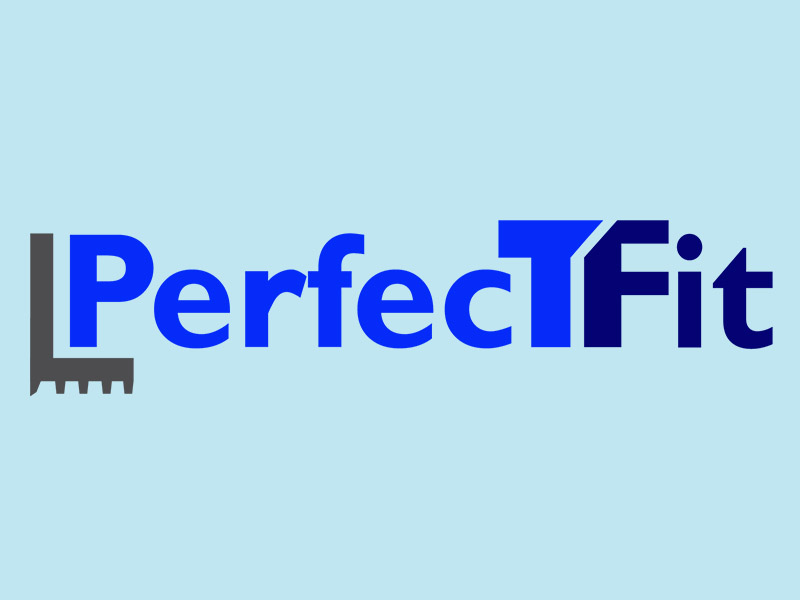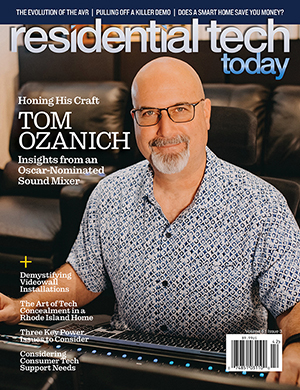By Anthony Leo
Marc Oliveri, owner of Mero Concepts, considers his Austin, TX-based integration company a “boutique-type firm,” that tries to align with clients who have a shared vision. Prior to starting his firm, Oliveri worked at Apple for 10 years, where he served in the company’s education group, traveling to school districts to discuss how Apple products and services could integrate into the educational environment. He says that he learned early on not to push hardware in his meetings, but to emphasize the experience of using certain educational tools in the classroom.
His initial work in the integration field began as a “moonlighting” gig, helping a friend and neighbor fix the security cameras and control systems in four restaurants that he owned. By 2012, he was ready to leave Apple and enter the system integration field full time. “I was getting ready to turn 40 and didn’t want to look back in 20 years and say, ‘I wish I would have started this company…’” Here’s what else we learned from our conversation with Oliveri.
Residential Tech Today: Were your super-visors at Apple aware that you were doing integration work on the side while working there?
Marc Oliveri: My management team at Apple knew what I was doing and when I told them I was thinking about doing this full time, they said I could name my end date with them. I left them on really good terms. To this day, directors at the company still use our services for their homes.
RT Today: What are some of the lessons that you learned at Apple that you apply to your business today?
Marc Oliveri: I picked up a lot of design language, aesthetic cues, and how to treat the customer. Their philosophy is to “surprise and delight,” and that’s what we try to do at Mero Concepts. Our tagline is “seamless integration with seamless customer service.” We really push hard on customer service. We show it in everything we do, day to day. We even try to hire toward that. We’re just a small firm – there are only seven of us – but our guys are really focused on making sure our clients’ expectations are exceeded.
We’ll do that in various ways, from how our guys interact from the beginning to how we handle internal service calls. Mero Concepts partnered with OneVision, and they’re our first line of triage with our clients and so we really want our clients when they call in to be treated well and we respond quickly to their calls. Our Lexus RX 350 service vehicle is a little showy, but we do it so the client associates our level of service with the Lexus brand and their pursuit of service excellence. On the back it says, “24/7 Planning Support Vehicle.”
RT Today: In what ways do you apply a design language to the projects that you
work on?
Marc Oliveri: One example is a project inside a 5,000-square-foot art gallery in downtown Austin. The client’s attention to detail was off the charts; her front glass doors, alone, were almost $70,000. For the project, we had James Loudspeaker custom build their pendant speakers to the client’s specifications and had them custom painted to her specific color palette. She was adamant that anything that was installed had to match her environment. We even disassembled all of her access points for her Wi-Fi, took all of the cameras apart, broke all of the DSC alarm components down, and had James custom paint to her custom colors.
This turned into a real showcase for us because she’s got 16 James Loudspeakers that are all custom painted in her environment, tied into an AudioControl interface, Control4, and 55- and 77-inch Sony OLED displays that display digital artwork alongside with her “analog” artwork. It’s a really gorgeous environment.
RT Today: What are the most important lessons you’ve learned since starting your integration business?
Marc Oliveri: One of the big lessons learned is just focusing on follow up and follow through with clients. We know that everything isn’t going to go perfectly smooth and exactly as we planned to go every time, but if you set the right expectations and you follow through with the client, they’re typically very flexible and understanding with what you’re trying to do.
I also learned that clearly communicating is a big deal. We stumbled a little bit in the beginning and we still learn lessons today, just making sure clients know where we’re at on projects. Especially on a commercial project, we never want to be the hold up. We always try to be spot on with when we’re going to be there and what our process will be. That’s how you gain trust with the GCs of a project and the owners and the other trades, which can lead to other jobs.
RT Today: What part of this business makes you happiest?
Marc Oliveri: The happiest for me is when the client kind of gets it, and we’re delivering the final piece of the project. When we get that feedback the day after, unsolicited. We consistently will get emails or a text from a client about how great our guys were out on site, how they enjoyed having them there… That’s the biggest thing that feeds us, is getting that kind of feedback.
RT Today: What do you find most frustrating?
Marc Oliveri: The industry itself is not regulating as well as I feel that it should. That’s one of the reasons we aligned with HTA [Home Technology Association.] We feel that we’ve made these investments as a company in not only our office/environment but also in our staff, their training, and making sure we are certified and licensed to do security. I feel that piece is missing and if we had that it would clean up the industry.
I just don’t like that our industry has the worst rap. Some of the problem is with distribution, where they will sell to anyone with a pulse because they just want the sale. I feel like that’s a big disconnect because those integrators make integrators like us look bad. We hear, “Oh, you’re the second company we’ve had out here. The other guy had the best price, but he never finished.” That’s what gets frustrating because it makes us all look bad.
RT Today: When you’re deciding whether to start offering a new product or technology in your projects, what are some of the most important criteria you consider?
Marc Oliveri: Mero Concepts is a bit of a hybrid. We will early adopt in our own environment to test and see. But, a big piece is the support from the manufacturer. It’s all technology. It’s all electronics. At any time, things can go sideways or there could be an issue. With every manufacturer, it’s like the perpetual beta, and firmware updates are always fixing something.
What we try to do is first look at a manufacturer’s pedigree or how long they’ve been doing this, how long they’ve been in this industry, and what is there backing. And because we have our office and enough space to connect products, manufacturers will send us something to try out. Then our guys use it, learn it, and see if it’s the right fit. If there are hiccups, we test out their support. If there’s good support, then we feel like we can move forward with them.
RT Today: Currently, do you have favorite products or technology that you like to work with and why?
Marc Oliveri: I’m really in love with the Arcam line of AVRs. Just a solid build. You can tell they’re engineered for performance with just the right amount of feature sets without being all glitzy. Then if you look at speaker lines, I really like what we do with James because of how they customize for us. Same thing with the AudioControl amps. It’s a great story. It’s a U.S.-manufactured product, and they have very customizable EQs that are paired to major speaker manufacturers. I also really like Revel’s bookshelf speakers.
RT Today: Looking ahead, what technology trend do you expect to have the most influence on the work that you do?
Marc Oliveri: There’s a thing that Steve Jobs used to say about speech recognition. That in five years, it was going to be amazing. And, that’s kind of how I feel about voice control right now. Right now, a lot of voice delivers 90 to 95 percent of the time. That seems like it’s really good, but actually it isn’t because what happens is the four percent that it’s off causes people to pause and not use the systems or causes people to not get comfortable. The system should be able to know what room I’m in and how to turn this on. That still isn’t there, but I think it’s getting there.
Beyond that, I really hope that the industry develops a standardization to have devices truly work together and communicate with each other in a way that allows these companies not to feel threatened. If I buy X’s voice control, but I want to have Y’s lighting system in it, there should be a standard bus communication that allows things to talk and communicate universally. There needs to be that piece so that the complexity is reduced, and the experience for the end user is better overall, and they champion to have these devices in their homes. Everyone wants to automate something. How cool is it when it recognizes that you’re home, and it turns on what you want it to turn on.








